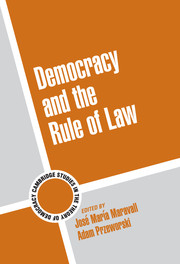Crossref Citations
This Book has been
cited by the following publications. This list is generated based on data provided by Crossref.
2003.
Debate: Séparation des pouvoirs et indépendance du judiciaire: une problematique en transformation.
Swiss Political Science Review,
Vol. 9,
Issue. 3,
p.
113.
Morlino, Leonardo
2003.
What is a ‘Good’ Democracy? Theory and the Case of Italy.
South European Society and Politics,
Vol. 8,
Issue. 3,
p.
1.
Ferejohn, John A.
Rosenbluth, Frances McCall
and
Shipan, Charles R.
2004.
Comparative Judicial Politics.
SSRN Electronic Journal,
Tamanaha, Brian Z.
2004.
On the Rule of Law.
Navia, Patricio
and
Ríos-Figueroa, Julio
2005.
The Constitutional Adjudication Mosaic of Latin America.
Comparative Political Studies,
Vol. 38,
Issue. 2,
p.
189.
Hedlund, Stefan
2006.
Vladimir the great, Grand Prince of Muscovy: Resurrecting the Russian service state.
Europe-Asia Studies,
Vol. 58,
Issue. 5,
p.
775.
Ohnesorge, John K.M.
2007.
The Rule of Law.
Annual Review of Law and Social Science,
Vol. 3,
Issue. 1,
p.
99.
Bonner, Michelle D.
2008.
Law and Injustice in Latin America.
Latin American Politics and Society,
Vol. 50,
Issue. 1,
p.
169.
Dyzenhaus, David
2008.
Emergencies and the Limits of Legality.
p.
33.
Kapiszewski, Diana
and
Taylor, Matthew M.
2008.
Doing Courts Justice? Studying Judicial Politics in Latin America.
Perspectives on Politics,
Vol. 6,
Issue. 4,
p.
741.
Hoff, Karla
and
Stiglitz, Joseph E.
2008.
Exiting a Lawless State.
The Economic Journal,
Vol. 118,
Issue. 531,
p.
1474.
Bonner, Michelle D.
2009.
Media as Social Accountability.
The International Journal of Press/Politics,
Vol. 14,
Issue. 3,
p.
296.
Alter, Karen J.
2009.
The European Court's Political Power Across Time and Space.
SSRN Electronic Journal,
BONNER, MICHELLE D.
2009.
State Discourses, Police Violence and Democratisation in Argentina.
Bulletin of Latin American Research,
Vol. 28,
Issue. 2,
p.
227.
Lever, Annabelle
2009.
Democracy and Judicial Review: Are They Really Incompatible?.
Perspectives on Politics,
Vol. 7,
Issue. 4,
p.
805.
Woods, Patricia J.
and
Hilbink, Lisa
2009.
Comparative Sources of Judicial Empowerment.
Political Research Quarterly,
Vol. 62,
Issue. 4,
p.
745.
Domingo, Pilar
2010.
Cultures of Legality.
p.
254.
Alonso, Sonia
2011.
The Future of Representative Democracy.
p.
169.
Chang, Yu-tzung
Chu, Yun-han
and
Huang, Min-hua
2011.
Procedural quality only? Taiwanese democracy reconsidered.
International Political Science Review,
Vol. 32,
Issue. 5,
p.
598.
Sundar, Nandini
2011.
The rule of law and citizenship in central India: post-colonial dilemmas.
Citizenship Studies,
Vol. 15,
Issue. 3-4,
p.
419.





